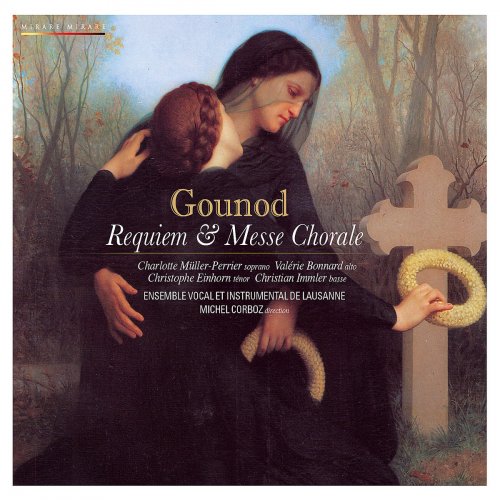
Michel Corboz, Ensemble Vocal de Lausanne, Ensemble Instrumental de Lausanne - Requiem & Messe Chorale (2011)
BAND/ARTIST: Michel Corboz, Ensemble Vocal de Lausanne, Ensemble Instrumental de Lausanne, Charlotte Müller Perrier, Valérie Bonnard
- Title: Requiem & Messe Chorale
- Year Of Release: 2011
- Label: Mirare
- Genre: Classical
- Quality: flac lossless +booklet
- Total Time: 01:03:04
- Total Size: 263 mb
- WebSite: Album Preview
Tracklist
---------
01. Messe de Requiem en Ut Majeur: I. Introït & Kyrie
02. Messe de Requiem en Ut Majeur: II. Dies Irae
03. Messe de Requiem en Ut Majeur: III. Sanctus
04. Messe de Requiem en Ut Majeur: IV. Benedictus
05. Messe de Requiem en Ut Majeur: V. Pie Jesu
06. Messe de Requiem en Ut Majeur: VI. Agnus Dei
07. Messe Chorale en Sol mineur: I. Introït
08. Messe Chorale en Sol mineur: II. Kyrie
09. Messe Chorale en Sol mineur: III. Gloria
10. Messe Chorale en Sol mineur: IV. Credo
11. Messe Chorale en Sol mineur: V. Sanctus
12. Messe Chorale en Sol mineur: VI. Benedictus
13. Messe Chorale en Sol mineur: VII. Agnus Dei
Composers
Gounod, Charles François (1818-93)
Charles Gounod, wrote the Requiem, one of his finest pieces, between 1889 and Palm Sunday 1891, the date he added 'fin' to the foot of his manuscript. It is likely he continued to revise the work until 21 February 1893, the day he sent the score to the Société des Concerts du Conservatoire. According to his friend and student Henri Busser, just three days before his death, Gounod was still rivetted: "...on 15 October 1893, he was still playing passages of "his" Requiem at the piano when he had a fit of apoplexy. Though out of breath, he still tried to continue singing the duet from the Benedictus with his daughter, then carefully put the manuscript away...In the afternoon he was felled by a stroke and lost consciousness. He never emerged from the ensuing coma, and died in the small hours of 18 October..." What is most impressive about this magnificient composition (which, like Fauré's Requiem, ignores the terrors of the final judgement and the horrors of death, this is the path to eternal light which Gounod aspired to follow during his waning years. The "Dies Irae" does not begin with a stormy eruption typical of the romantic but is marked by a haunting, rhythmic, mysterious motive. The most terrifying verses about horror, death and judgement are set to the work's most beautiful passages, serene, celestial, as if the heavens were opening: the "Recordare", sung by a soprano and taken up by the chorus.
---------
01. Messe de Requiem en Ut Majeur: I. Introït & Kyrie
02. Messe de Requiem en Ut Majeur: II. Dies Irae
03. Messe de Requiem en Ut Majeur: III. Sanctus
04. Messe de Requiem en Ut Majeur: IV. Benedictus
05. Messe de Requiem en Ut Majeur: V. Pie Jesu
06. Messe de Requiem en Ut Majeur: VI. Agnus Dei
07. Messe Chorale en Sol mineur: I. Introït
08. Messe Chorale en Sol mineur: II. Kyrie
09. Messe Chorale en Sol mineur: III. Gloria
10. Messe Chorale en Sol mineur: IV. Credo
11. Messe Chorale en Sol mineur: V. Sanctus
12. Messe Chorale en Sol mineur: VI. Benedictus
13. Messe Chorale en Sol mineur: VII. Agnus Dei
Composers
Gounod, Charles François (1818-93)
Charles Gounod, wrote the Requiem, one of his finest pieces, between 1889 and Palm Sunday 1891, the date he added 'fin' to the foot of his manuscript. It is likely he continued to revise the work until 21 February 1893, the day he sent the score to the Société des Concerts du Conservatoire. According to his friend and student Henri Busser, just three days before his death, Gounod was still rivetted: "...on 15 October 1893, he was still playing passages of "his" Requiem at the piano when he had a fit of apoplexy. Though out of breath, he still tried to continue singing the duet from the Benedictus with his daughter, then carefully put the manuscript away...In the afternoon he was felled by a stroke and lost consciousness. He never emerged from the ensuing coma, and died in the small hours of 18 October..." What is most impressive about this magnificient composition (which, like Fauré's Requiem, ignores the terrors of the final judgement and the horrors of death, this is the path to eternal light which Gounod aspired to follow during his waning years. The "Dies Irae" does not begin with a stormy eruption typical of the romantic but is marked by a haunting, rhythmic, mysterious motive. The most terrifying verses about horror, death and judgement are set to the work's most beautiful passages, serene, celestial, as if the heavens were opening: the "Recordare", sung by a soprano and taken up by the chorus.
As a ISRA.CLOUD's PREMIUM member you will have the following benefits:
- Unlimited high speed downloads
- Download directly without waiting time
- Unlimited parallel downloads
- Support for download accelerators
- No advertising
- Resume broken downloads


